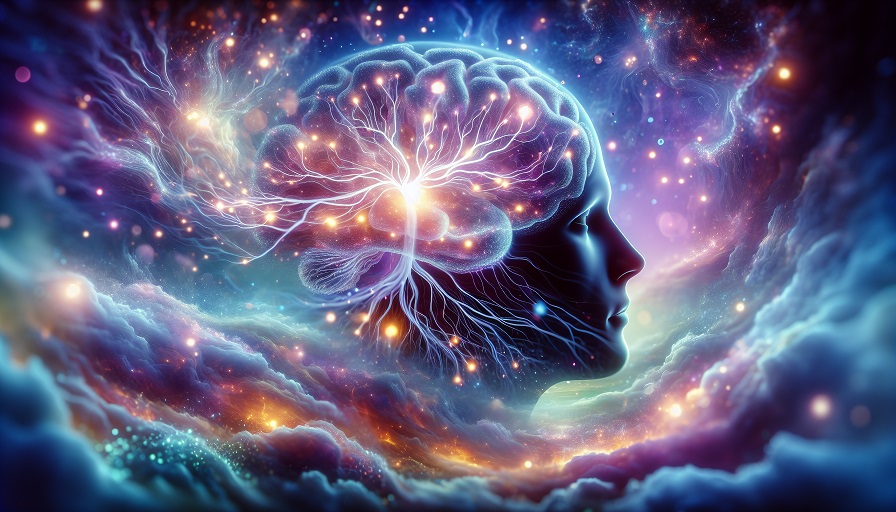
We love the myth of the tortured artist. The erratic genius. The sleepless visionary scribbling ideas at 3 a.m. with coffee in one hand and madness in the other. From Beethoven to Bukowski, pop culture has sold us on the idea that creativity springs from chaos – that the messier your life, the more inspired your mind.
But here’s the problem: it’s a myth. And for most people, it’s holding their creativity hostage.
Creativity doesn’t thrive in mental clutter. It thrives in structure. Not rigid, soul-crushing routine – but a biological and environmental foundation that gives your brain the space and resources to think clearly, explore ideas, and make unexpected connections.
If your creativity feels stuck, scattered, or erratic, it may not be a lack of inspiration. It may be a lack of brain stability.
Contents
The Chaos-Creativity Myth
The idea that messy minds make masterpieces is romantic but deeply flawed. Sure, there have been brilliant people with turbulent lives – but correlation isn’t causation. In most cases, they created despite the chaos, not because of it.
The reality is that the creative brain needs fuel, rest, and rhythm. It needs neurotransmitter balance. It needs moments of quiet and long stretches of focused attention. And it’s really hard to create anything meaningful when you’re underslept, undernourished, and overstimulated.
Chaos doesn’t produce creativity. It disrupts it.
Why Your Brain Needs Structure to Be Creative
Creativity isn’t just inspiration – it’s a complex cognitive process that involves memory, attention, executive function, and emotional regulation. These all live in your prefrontal cortex. And guess what? That part of your brain performs best when it’s well-supported.
Without structure, your brain spends all its energy putting out fires: decision fatigue, stress response, blood sugar crashes, endless distractions. There’s nothing left for creative thinking. You need to protect your brain’s bandwidth so it can use its energy to innovate, not just survive.
Structure Doesn’t Kill Creativity – It Protects It
When most people hear “structure,” they think of time blocks and strict routines. But structure can be fluid. It’s not about restricting ideas. It’s about creating an ecosystem where ideas can actually grow.
Here’s how a little structure can help unlock creativity:
- Consistent sleep regulates mood and supports memory consolidation – both vital for creative problem-solving.
- Routines reduce decision fatigue, freeing mental energy for creative tasks.
- Focused time blocks help you get into “flow,” the state where your best work happens.
- Environmental cues (like music, lighting, or location) can train your brain to shift into creative mode more easily.
These aren’t productivity hacks. They’re brain-science basics. And when your brain feels safe, stable, and energized, creativity becomes easier – not forced.
What Happens When Your Brain Chemistry Is Off
Sometimes, no matter how well you plan, your creativity feels flat. You sit down to write, paint, brainstorm, or build – and nothing comes. That might not be a creative block. It might be a biological block.
If your neurotransmitters are imbalanced, if your brain is inflamed or under-fueled, the creative gears grind to a halt. You’re not uninspired – you’re underpowered.
Here are a few common brain chemistry imbalances that kill creativity:
- Low dopamine – Makes it hard to feel motivated or excited about ideas.
- Low acetylcholine – Leads to poor memory, slow thinking, and difficulty making connections.
- High cortisol – From chronic stress, which narrows your focus and kills big-picture thinking.
- Nutrient deficiencies – Especially B vitamins, magnesium, and omega-3s, all of which impact mood and cognition.
If your brain isn’t chemically prepared to create, no amount of Pinterest boards or “mood lighting” will make the ideas flow.
How Nootropics Can Support a Creative Brain
This is where nootropics – cognitive enhancers – can be a game-changer. They don’t create creativity out of thin air, but they can help restore the mental clarity and energy your brain needs to do creative work.
For example:
- Citicoline supports acetylcholine production, which is key for focus and memory – two pillars of creative output.
- Lion’s Mane Mushroom may promote neuroplasticity, helping you form new ideas and novel associations.
- Bacopa Monnieri enhances memory recall and reduces mental noise – great for deep work and brainstorming.
- L-Theanine fosters calm alertness, helping you enter creative flow without anxiety or jitteriness.
Nootropic blends like Mind Lab Pro combine these ingredients into a clean, synergistic formula that supports brain performance across multiple areas – without relying on harsh stimulants or sedatives. For creators who want to feel clear-headed and inspired without the crash, this kind of brain support can make a noticeable difference.
Balance Beats Burnout
The most prolific creatives aren’t the ones who suffer the most. They’re the ones who’ve learned to build a rhythm that keeps their brain energized, focused, and open to new ideas. They create boundaries, support their health, and treat creativity like a process – not a lightning strike.
Your best work won’t come from chaos. It will come from clarity. And clarity doesn’t happen by accident – it happens when your brain is firing on all cylinders.
Creativity isn’t magic – it’s biology meeting imagination. If your brain is scattered, depleted, or chemically out of balance, the ideas won’t flow – no matter how many candles you light or how “artsy” your environment looks.
Ditch the myth of the tortured genius. Embrace structure – not as a cage, but as scaffolding. Feed your brain. Rest your mind. Use tools like nootropics when needed. And give yourself the foundation your creativity has been waiting for.
Because the most powerful ideas don’t come from chaos. They come from a brain that’s ready for them.

